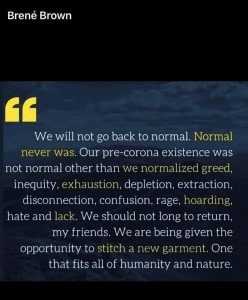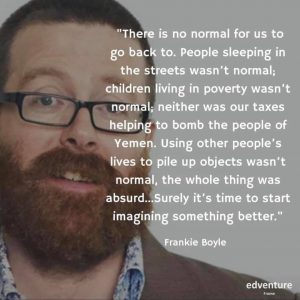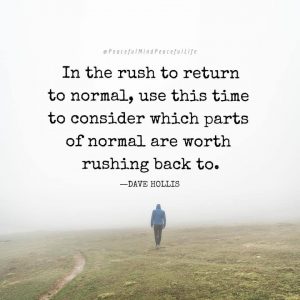Nigel Pimlott and I spent well over a decade at FYT and we have both moved from there to what I would call the edge of the inside. Nigel now works with the Methodist Church as Regional Learning and Development Officer (4 days a week) and church-wide Evangelism and Growth Officer (1 day a week), and I work as the Director of Mission Innovation and Fresh Expressions in Cumbria. So, in the next few posts Nigel and I will explore some of the early and more recent pioneer learning and explore why the church can seem reluctant to draw on this resource.
To set the scene I want to revisit some of the cultural backdrop and responses to the story we now find ourselves in. The pace of cultural change has been accelerating over the last 70 years. Where previously we talked about longer term generational change, more recently significant cultural shifts have been noted at least every ten years. The Face Magazine back in the noughties was talking about significant shifts every decade: 1960’s The Decade of Optimism, 1970’s The Decade of Decline, 1980’s The Decade of the Individual, 1990’s Caring and Sharing, 2000s The Digital Decade. Although the Face article only went up to the noughties, several commentators suggest 2010’s as The Decade of Participation. This with the larger overarching constructs of Post-Modernism and Post-Christendom was the culture I swam in when I started in ministry back in the late 80s. For at least two decades I felt I was swimming in a completely different sea to everyone else. During that time I was grateful to link with Frontier Youth Trust who grew in response to the challenging culture of the 1960s seeking to respond to these new entities called “teenagers”. With FYT I started to recognise, thanks to the brilliant work of Jim Punton and Terry Dunnell, that as well as finding new ways to do things we also had to find new ways to think about things. I learnt that practice and reflection went hand in hand and as early as 1993 with others we started thinking through the need for a new type of ecclesiology. We had critical conversation partners such as Jim Punton, whose work on shalom was key, and several early pioneer workers and thinkers with decades of experience, like David Watson (and Graham Cray), Jeanne Hinton, Pip Wilson, and David Sheppard. It is interesting to reflect on how well these people were listened to at the time and how this helped prepare the way for some radical change, and later Nigel picks up why we may struggle to listen as well to edge now.
The two Loops of Change theory talks about the need for innovators to network and this was key to the survival of what was being birthed throughout the 90s and 00s. Towards the turn of the century a clear emerging church movement was building (often with youth workers getting older and trying to work out how to connect to their culture) and slowly we met others who were in the same ocean. Eventually the structures also started to recognise what was happening on the edge, and that they were perhaps not as well equipped as they thought to swim well in these fast moving currents, so Fresh Expressions was bought into being. Someone once said that Fresh Expressions was the “Research and Development wing” of the church. For the past 20 years several key denominations have been investing in Fresh Expressions, this generosity is a gift to pioneers and now maybe this wealth of learning could be a gift to the church.
With the two loops in mind churches have innovated well in the lockdown, either in the online space or in other ways, so it maybe worth asking, how are you networking with others to build knowledge and support yourselves? Many churches have been brilliantly creative, but innovators need to network not just for new ideas but more importantly to build the resilience needed to resource continuation. Someone once asked me when I was speaking at Greenbelt to say in three words what is needed in today’s missionary context and my answer was Courage, Courage, Courage. As churches reopen the pressure to restart the old will be on, but we can’t do everything, and you will need courage to say no, to not restart some things, courage to stand with what the spirit has been doing for the last weeks and courage to go to new places theologically. Networking will help you build the knowledge and story base to hold the innovative space you have found, and the friendships you build through networking will sustain and nourish your innovation, but alongside this maybe invite a local pioneer to walk with you through the processes, they will probably have more questions than answers but that is important right at the top of change curve.
Richard
Appreciating the hidden harvest: bias as virtue – Nigel writes…..
I’ve recently done some Unconscious Bias training. I’ve worked hard over the years and hopefully become more fully aware of my biases. As a white middle aged man, I think I have reasonably successfully endeavored to raise consciousness-levels regarding any gender, sexuality and race bias I may have had and I have sought to change my thinking and behaviour accordingly. However, I have recently become very aware of a whole set of biases that I embrace which I didn’t really know were there. I am pondering if these biases are a problem, or if they should not be called biases at all, but rather aspirations, virtues and/or essentials. Let me explain …
I am biased towards the ‘new’ and innovation – I think that’s an aspiration. I am committed to working in diverse and creative ways – I think this bias is a virtue. I remain passionate about involving younger people (participation) in the life of the church and I am biased to hearing all the voices in as many ways as possible, and on their terms – I think that’s an essential. Bias on the basis of gender, sexuality, or race is, I believe, a big problem, but the biases I refer to here I consider virtues, not problems. My challenge is, I note other people don’t see things this way. For them, my ‘new’, ‘creative’, ‘younger’ biases are a threat.
In 2015-16 The Methodist Church carried out research into 15 years of involvement with fresh expressions and in 2019 produced a report of the findings – Methodism’s Hidden Harvest. The research concluded that fresh expressions have been extremely successful in welcoming previously unaffiliated people into Christian faith exploration and participation, certainly much more successful than the vast majority of inherited Methodist churches. So why isn’t everybody who wants to reach unaffiliated people drawing on these research findings and deploying them?
• Why isn’t everybody looking to start something new rather than simply maintain ‘what is’? The research notes that fresh expressions are evangelistically fruitful, with an estimated 65% of those attending having no previous involvement in church.
• Why isn’t everybody looking to grow the church working in diverse and creative ways – the research notes that fresh expressions work in multiple and creative ways to make disciples and asks if this is an important factor inherited church needs to embrace if it is to similarly attract unaffiliated people.
• If the church wants to engage and disciple younger people, why does it not embrace how fresh expressions go about doing this as they appear much more successful at it?
Could it be that the reluctance to embrace the new, creativity and younger people’s participation is the unconscious bias, perhaps conscious bias, of some people against such things? If so, this bias is putting them in danger of disregarding things which don’t fit their own templates, paradigms and worldviews, at the expense of making disciples and growing the church. In other words, the problem isn’t my bias for these things, but the bias of those who will not embrace such things.
Of course, it’s not as simple as this, nor a binary choice, and hopefully not a case of inherited church vs fresh expressions; ‘them and us’. Having said that it sometimes feels like it is! Drawing on a bit of political bias thinking, I will explain what I mean.
There is what is known as Confirmation bias – in our context this is when someone favours information about church that affirms their existing paradigms and worldviews. People who like inherited models of church and who don’t want to change might, for example, draw exclusively on narratives that value tradition and predictability of output. They might use information that espouses the familiar, embeds and promotes an ‘it’s what we know’ paradigm. In my experience, whenever I draw on research findings like the Hidden Harvest? report, endeavor to facilitate debate, and/or offer suggestions to those in declining churches facing uncertain futures, there is more often than not push back and a negative response to counteracting information – like the value of new approaches, creativity, and aiming younger – which conflicts with favoured information.
Then there is what is called Coverage bias – this is when, for example, someone happily tells (covers) stories that relate to the ‘good old days’, when the church was full, overseas mission adventures from yesteryear, what happened in 1970, but rarely, if ever, tells stories or allows space for others to tell stories, about what is happening now in new forms of church and the changed lives of those becoming disciples.
Thirdly, I would highlight Concision bias – where people selectively focus on information, ignoring nuance and context, in ways that crowd out different views that take longer to explain. For example, someone will often counteract my encouragement for the new, creative and younger with a tale of when a fresh expression closed, a project failed or a young person left. The detail, reasons, learning and legacy are never portrayed, just the (perceived) negative outcome.
A couple of years back I had surgery for cancer. It was radical, impacting and has meant things will forever be different. If I had not had it, my future was uncertain, and I probably would have died many years prematurely. I needed to set aside my bias against someone chopping bits out of me, having lots of injections, not to mention several other deeply personal things that might not be appropriate to mention in a public blog. It was challenging but necessary.
If we are to set aside our biases and embrace the virtuous findings of research and development from fresh expressions of church, the consequent changes we need to make will be challenging and necessary. If we don’t make them, we may discover our end is also more premature than it might have otherwise been.
You can access the full results of the Hidden Harvest? research here
Dr Nigel Pimlott
Expressing a personal reflection especially for Sunday Papers
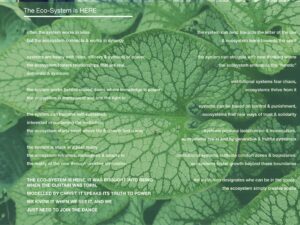


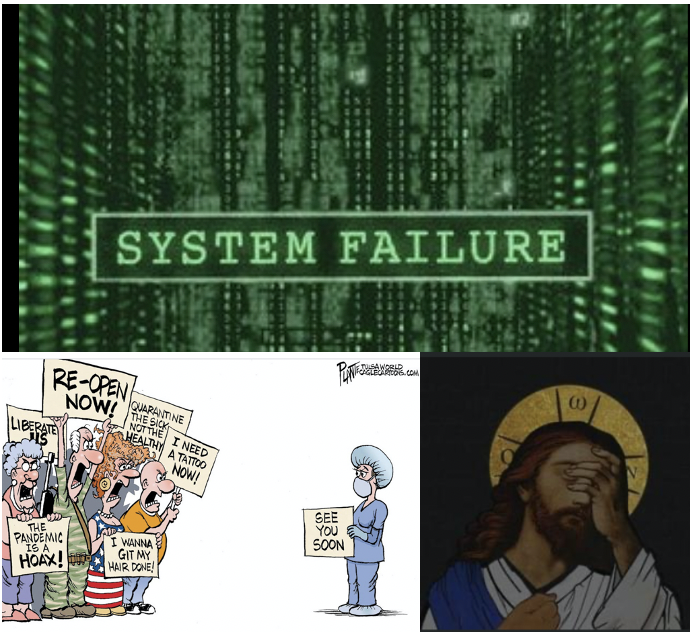 I do think some of the reactions in the USA for me just show how addicted we are, (not just how they are), to a consumerist capitalist system, and I really do think these are signs of system failure. Most of my life we have talked of the shifts from modernity to post modernity to post secularisation and the collapse of our financial system as the consequences of a system where money has become disconnected from the real when we ended the gold standard, and where the system has created economic slavery and an insatiable desire to use the worlds resources beyond what is sustainable and now faces global warming and ecoside.
I do think some of the reactions in the USA for me just show how addicted we are, (not just how they are), to a consumerist capitalist system, and I really do think these are signs of system failure. Most of my life we have talked of the shifts from modernity to post modernity to post secularisation and the collapse of our financial system as the consequences of a system where money has become disconnected from the real when we ended the gold standard, and where the system has created economic slavery and an insatiable desire to use the worlds resources beyond what is sustainable and now faces global warming and ecoside.